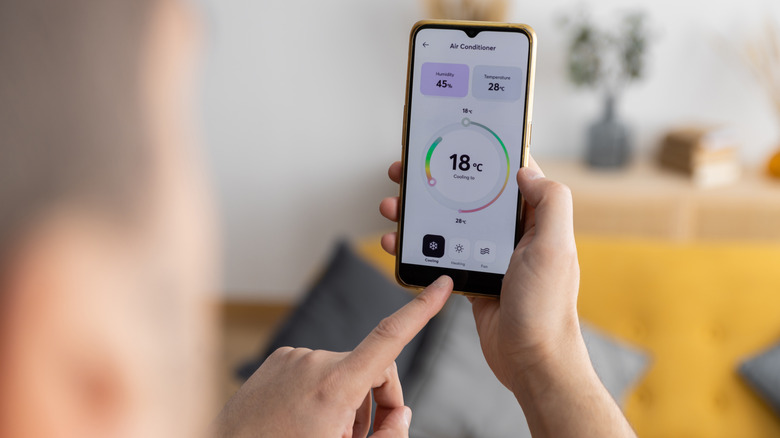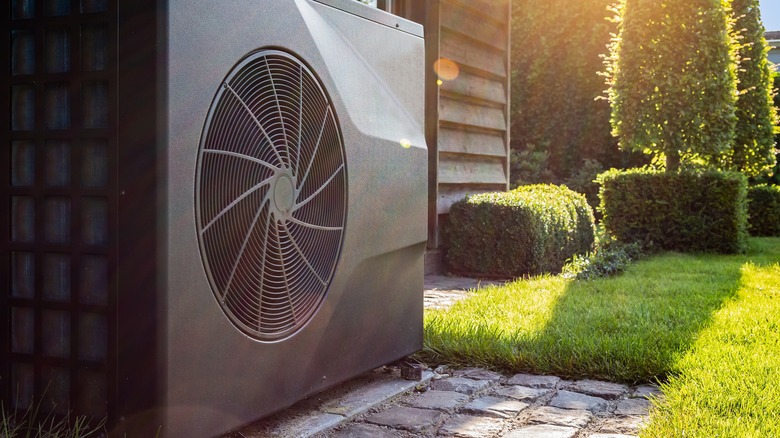Can Leaving Your AC On All Day Save You Money?
Air conditioning makes up about 40 percent of the electric bill in the summer, which leaves many new homeowners wondering how they can save money on cooling. Perhaps you've heard that leaving your AC on all day is the money-saving trick, but is the claim true? Reliable sources say it is, but others say that shutting the AC off during a standard eight-hour workday uses less energy over a 24-hour period than leaving it on all day.
Texas' 12NewsNow is one source that weighed in on the debate. The news channel ran a Verify segment and consulted experts from three energy companies as well as an HVAC technician (via YouTube). They claim that leaving the AC on during the day is more energy-efficient than shutting it off, and therefore, more cost-effective, but with a minor caveat about the temperature set point. On the other side of the argument are experts, including a team of architectural and building systems engineers, who assert that the opposite is true — or can be true, contingent on a couple of factors. One factor involves the outdoor temperature and heat index, compared to the indoor temperature.
How leaving the AC on during the day can save you money
12NewsNow states that maintaining a specific temperature during the day requires less energy than it does to lower it in a short amount of time (via YouTube). HVAC technician Francisco Chavez told them that it will be "harder on the system to try to catch up than, say 74 all day." Experts support the assertion, adding that leaving the AC off for a few hours on a hot day can disrupt the temperature balance of your home.
This doesn't mean you should leave your AC fan running all day, though. If you select the On fan setting on your thermostat instead of Auto, the AC will run continuously and dramatically raise your electric bill. The Auto setting means the AC fan will run only when the interior temperature reaches the thermostat set point. Once it reaches that temp, the fan will shut off. This process will repeat as long as the AC is turned on. To maximize your savings with the AC set to Auto all day, it's best to raise the set point a few degrees, manually or with a program setting, when nobody's home. According to the U.S. Department of Energy, people can save up to 10 percent a year by adjusting their thermostat 7 to 10 degrees from its normal setting for eight hours a day.
When turning AC off during the day can save you money
Although leaving the AC on during the day can be more energy efficient than leaving it off, there are some circumstances in which you'd save money by turning it off. To demonstrate this claim, a group of engineers conducted an experiment in which they simulated heat transfer and AC cooling in a hypothetical 1,200 square-foot home (via The Conversation). They compared the temperature and energy consumption data in multiple scenarios, in Georgia and Arizona. In both states, they found that a central AC system consumed more energy when it was on all day than when it was off for eight hours.
The experiment also revealed that the outdoor climate plays a role in the efficiency of an AC system. The higher the heat index, the less effective the AC system will be in cooling the home. Therefore, it's best to leave it off during the hottest time of the day if you live in a state that experiences extreme heat; the smaller the difference is between the indoor and outdoor temperature, the lower your energy bill will be. So if you live somewhere that doesn't typically experience high heat, you're more likely to save money by leaving the AC on all day and increasing the temp by a few degrees while you're away. Otherwise, you'll likely see a bigger savings by shutting it off during the day, since an AC system cools less effectively during the mid-day high temperatures.


